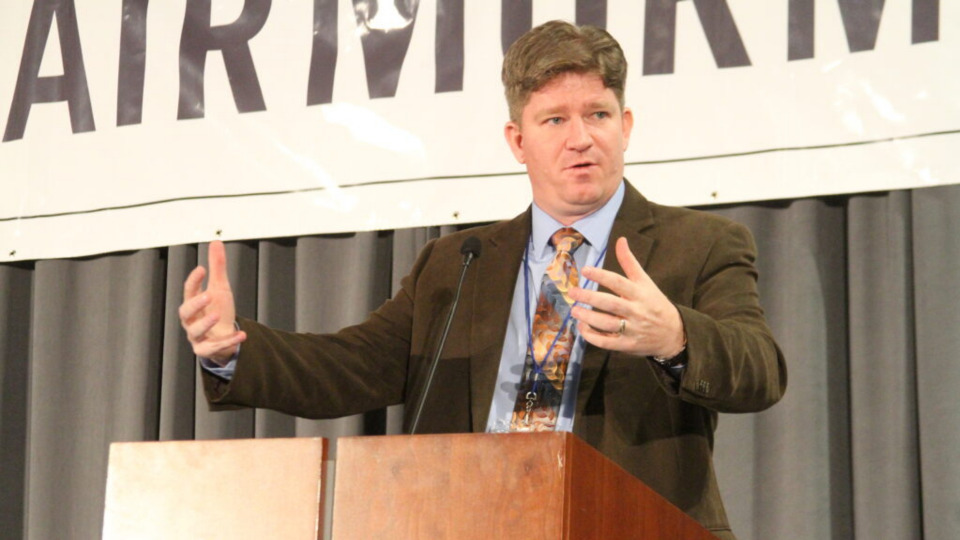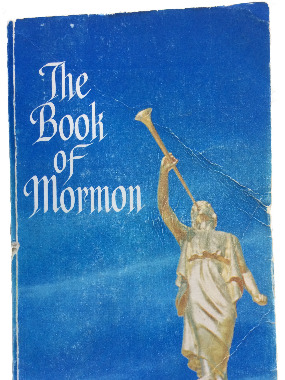
truth pillars
Keith Erekson, director of Church History Library, speaks at the FairMormon Conference about the Book of Mormon witnesses on August 3, 2017. Photo by R. Scott Lloyd, courtesy of Church History.Copyright 2021 Deseret News Publishing Company. All rights reserved.This story appears here courtesy of TheChurchNews.com. It is not for use by other media.
By Megan McKellar, Church News
For Church History Library Director Keith A. Erekson, there are many reasons to study Church history, such as the insights into the nature of God that having an accurate understanding of history and God’s dealings with His children can provide.
Studying history can also bring understanding about current circumstances. “The present that we live in was built in the past,” he said. “All of the things that we deal with — the current challenges, the current infrastructure, our societies … they all have a history, and it influences everything we do each day.”
Erekson recently joined the Church News podcast to discuss the importance of determining if information is accurate and true, and the tools he uses to do so in Church history.
First, anytime someone struggles with a question about the Church’s history or practices, it’s important to acknowledge that struggle as “really important and really significant,” he explained. “If something is unsettling, then we need to address it.”
Latter-day Saints, he said, are good at invoking tools such as prayer and scripture study when faced with questions, which are both important things to do, but it’s also necessary to employ “thinking skills or habits.”
Perpetuating false or partially true stories can have damaging effects. When narratives leave out whole groups of people entirely, people fail to see themselves in history.
“If we’re trying to learn how God blesses people … but you never see anyone in the story that looks like you, then you start to wonder: ‘Well, does God protect me? I see God protects those other people in the story. But what about people like me?’”
He gave the example of women in Church history: “Many stories from Church history leave out women — half of the Church’s population or more, and so we have to be better at telling the complete and accurate stories,” he said.
Truth, to Erekson, is a process and a way of thinking and being. His method of seeking truth involves five pillars.
1. Accuracy
The test for accuracy in history and other kinds of information is “corroboration,” he explained. “Can we find another source that shares the same information? That increases the likelihood [of accuracy].”
2. Authenticity

truth pillars
This copy of the Book of Mormon was donated to the Church in 1989 with forged annotations purportedly made by Elvis Presley. Photo courtesy of Keith A. Erekson, courtesy of Church News. All rights reserved.A few years ago, Keith Erekson investigated a copy of the Book of Mormon that was believed to belong to Elvis Presley. At the end of the analysis, it was found that the handwriting in the book was forged.
He believes stories like this one survive because they have more meaning than just the artifact: “People would tell the story, and they would draw lessons from it — something about Elvis reading the book and thinking that it was valuable, and therefore, that legitimizes our faith. … A lot of times people cling to the artifact, because they really, really want the story to be true that’s built on top of the artifact.”
3. Reliability
He described the criteria of reliability as determining whether a source has a record of providing accurate information. “You can say: ‘OK, this person or this source has told me 10 things. Nine of them I can test or corroborate and nine of them hold up. The chances are that the 10th one is also going to be sound.’”
4. Fairness
There are ways that people can take information and take it out of context and present it in a way that’s not fair to the way it was originally used, he said.
5. Comprehensive Search
He gave the example of someone who has studied every major medical study on an issue in the last 40 years, as opposed to someone searching online about a health issue and reading one article — the first individual would be more persuasive because of their comprehensive knowledge.
Erekson has found that after studying so much history, he knows less and knows more at the same time.
“One of the things that happens as you study history is you realize how much we don’t know — how many lives passed on without leaving a record, how many things are unknown. For me, that causes a sense of humility,” he said.
He believes that some of the current divisiveness in modern society originates from “being so certain that we’re absolutely right.”
“Prophets like Nephi and Alma just say right out: ‘I don’t know. I don’t know the meaning of all things. I know God loves His children. I know He has all power, but I don’t know everything.’”
The study of history has also helped Erekson to see more of the times where God is dealing mercifully and benevolently with each of His children.
“Rather than saying, ‘I don’t think it’s a coincidence,’ I think we should positively say: ‘That was God. He was leading me through His Spirit. He was blessing me with a tender mercy.’”
Copyright 2021 Deseret News Publishing Company
